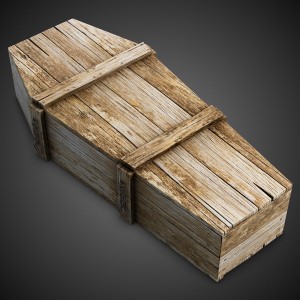From the Genesis:
When Jacob ended his charge to his sons, he drew up his feet into the bed, breathed his last, and was gathered to his people.
(From the Daily Office Lectionary – Genesis 49:33 (NRSV) – April 1, 2014.)
 He has kicked the bucket, cashed in his chips, shuffled off this mortal coil, gone the way of all flesh, croaked, gone home, passed away, turned up his toes, ridden the pale horse, fallen off his perch, taken his last bow, entered larger life, joined the choir invisible.
He has kicked the bucket, cashed in his chips, shuffled off this mortal coil, gone the way of all flesh, croaked, gone home, passed away, turned up his toes, ridden the pale horse, fallen off his perch, taken his last bow, entered larger life, joined the choir invisible.
We have so many idioms and euphemisms for the simple reality of death. I suppose that is because death is frightening, although if we take our Christian faith seriously it should not be.
The epistle lesson for the Easter vigil is always a short reading from Paul’s letter to the Romans in which the Apostle reminds us that “we have died with Christ, [and] we believe that we will also live with him.” (Rom. 6:8) There really is nothing to fear. Still, we avoid even mentioning death by using all these idioms and euphemisms (and many more).
As these turns of phrase go, none is quite so lovely as this verse in Genesis describing the death of Israel (Jacob): “He was gathered to his people.” I find something about that very comforting; I’ve never been a big fan of the “going home” euphemism which it resembles (even though there is biblical warrant for it), but I find this image of joining earlier generations inviting. Perhaps that is because of the fond memories I have of childhood family reunions.
In a former parish, I had a congregant who frequently would turn the discussion in bible study or adult education classes to the question of life after death. “I just want to know what happens when I die,” she would say. “Martha,” I would answer, “I don’t know. I haven’t been there yet.”
I don’t know, but I do have faith that our Book of Common Prayer is accurate when it says (in the Preface to the Eucharist to be said at a requiem), “to your faithful people, O Lord, life is changed, not ended; and when our mortal body lies in death, there is prepared for us a dwelling place eternal in the heavens.” (BCP 1979, page 381) One of the collects in the Burial Office includes this petition: “Give us faith to see in death the gate of eternal life, so that in quiet confidence we may continue our course on earth, until, by your call, we are reunited with those who have gone before.” (page 493) Until, the writers of Genesis might have said, we are gathered to our people.
Lent begins with a reminder of our mortality: “You are dust and to dust you shall return.” Here in the middle of the season we find another, but rather more comforting, reminder: you are a part of a people and to your people you shall be gathered.
====================
A request to my readers: I’m trying to build the readership of this blog and I’d very much appreciate your help in doing so. If you find something here that is of value, please share it with others. If you are on Facebook, “like” the posts on your page so others can see them. If you are following me on Twitter, please “retweet” the notices of these meditations. If you have a blog of your own, please include mine in your links (a favor I will gladly reciprocate). Many thanks!
====================
Father Funston is the rector of St. Paul’s Episcopal Church, Medina, Ohio.



Leave a Reply